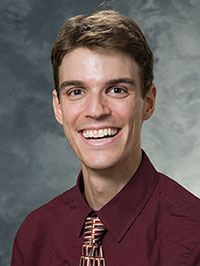A novel training curriculum involving an adapted Mindfulness-Based Stress Reduction program aims to promote resilience and prevent burnout among first-year residents in the UW Department of Family Medicine and Community Health’s (DFMCH) Madison residency program.
Burnout Prevalence and the Potential of Mindfulness

Vincent Minichiello, MD, and colleagues adapted the UW Health Mindfulness-Based Stress Reduction program into a novel training curriculum to promote wellness for Madison residents.
“This first year has proven that the training is indeed feasible within the context of resident education… We hope to refine the curriculum in a way that supports a lasting positive influence on physicians throughout their careers.”
Burnout—as frequently described in research with the Maslach Burnout Inventory—consists of three parts:
- “Burnout,” or exhaustion at the mere thought of work, physical symptoms related to fatigue and and sleeping difficulties;
- “Depersonalization,” or losing empathy in interpersonal relationships; and
- Decreased sense of personal achievement.
A study in the March 2014 issue of Academic Medicine found that 60.3% of residents and fellows nationwide—across all specialties—met the criteria for burnout.
Conversely, increasing physician resilience, or the ability to “bounce back” from experiences such as burnout, has been shown to have a significant positive impact on patient care and physician wellbeing. According to a March 2013 commentary in Academic Medicine, benefits include improved quality of care, reduced errors and minimized attrition.
There are a few, though growing, number of studies that use mindfulness meditation to target burnout and enhance resilience as it relates to resident physician training. Pilot studies at the University of Massachusetts, Duke University and the University of Toledo suggest that mindfulness-influenced wellness programs for residents can improve self-compassion, empathy, burnout and stress reactions.
Mindfulness meditation introduces a way of cultivating awareness of one’s relationship with the present moment. With practice, it may lead to healthier ways of working with stressful life experiences, including those inherent to residency training.
A Successful Program Adapted for Residents
Madison residency program graduate and integrative health fellow Vincent Minichiello, MD, along with former UW Health Mindfulness Program manager Bob Gillespie, PhD, and senior mindfulness teacher Laura Pinger, MS, adapted the successful UW Health Mindfulness-Based Stress Reduction course with DFMCH residents in mind.
The modified program is designed to take place during protected resident didactic time, and specifically addresses factors that contribute to resident burnout.
For example, one session focuses on the theme of transitioning from one clinical setting to another while also balancing time constraints—a common experience in resident life. Another brings attention to the practice of developing sustainable compassion, while yet another focuses on self-efficacy and being present to feelings of powerlessness.
In each session, residents learn techniques such as a body scan; sitting or walking meditation; and mindful movement, speaking and listening. Readings, audio meditations and home-based practice round out the program.
Early Results Show Promise, Inform Feasibility
All 17 first-year Madison residents were invited to participate in the pilot, which took place from September to November 2016. As this is the first year of the program, the intention was first and foremost to address the feasibility of delivering this curriculum within a residency training program, while assessing its usefulness for the residents themselves.
The program is in the process of being evaluated using mixed methods: quantitative validated questionnaires and qualitative anonymous resident phone interviews. Preliminary quantitative results showed slight increases in resilience and slight decreases in perceived stress among nine of the participating residents.
Dr. Minichiello presented an overview of the program at the DFMCH’s fellowship symposium on December 16, 2016. He is currently working with Supriya Hayer, MD, and Bruce Barrett, MD, PhD, to complete the program evaluation, and is planning on presenting the full analysis within the next few months.
“Our novel mindfulness-based training program serves as one of the few in the nation that addresses the health and well-being of resident physicians,” Dr. Minichiello notes.
“This first year has proven that the training is indeed feasible within the context of resident education. Based on resident feedback and the mixed-methods program evaluation, we hope to refine the curriculum in a way that supports a lasting positive influence on physicians throughout their careers.”
To learn more about the program, contact Dr. Minichiello.
This project was supported by a DFMCH Innovation Fund grant.
Published: January 2017
